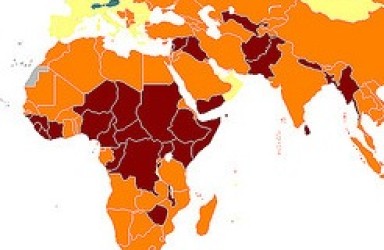Did domestic considerations dictate Gorbachev’s foreign policy approach?
This essay argues that Gorbachev’s foreign policy approach was determined, to a high degree, by the domestic considerations the Soviet Union faced at that time. The idea that these domestic considerations simply ‘dictated’ Gorbachev’s foreign policy approach is, however, too simple.
Examining the 1956 Suez Crisis
The 1956 Suez War marked a new chapter in the development of Middle Eastern politics.The emergence of Nasserism in the Middle East after the Suez crisis sustains the idea that Egypt was the sole winner of Suez. The Suez War managed to bring into question the significant role of the Middle East in world politics, particularly in the Cold War context.
Cold War containment: the role of the military
The policy of containment led directly to a radical change in the global positioning of the U.S. In the early period of Truman’s presidency U.S. armed forces were undergoing a large-scale programme of demobilisation, yet by its end in 1953 military and economic alliances were held with states in virtually every continent of the globe.
Bush and Blair: the impact of a special relationship on national interests
This dissertation argues that the ‘special’ relationship shared between Tony Blair and George W Bush while they presided over their respective countries’ had a greater effect on their own individual pursuit of national interests than conventionally acknowledged.
Assessing China and India’s New Role in Africa
This dissertation seeks to explore the rise of China and India in Africa, arguing that the two countries represent a second generation of donors that are able to free-ride on the previous reforms imposed by Western donors, and are then re-interpreting this to announce a new way of providing assistance, centred around ‘non-interference’ and respect for state sovereignty.
Islam and foreign policy making in Turkey
This essay argues that the AKP’s foreign policy is based upon pragmatism. This has resulted in the emergence of Turkey as an important global actor. Recent claims and traditional understandings of the Justice and Development Party’s foreign policy as Islamized are simplistic and derive from misleading theories and political propaganda.
The Question of Identity: The EU/Turkey Integration Debate
The eastward expansion of the EU has shown the flexibility of what is European. The future integration of Turkey is the next step towards increasing recognition that the values that unite Europe are indeed universal, and that therefore, European identity cannot be culturally or territorially bounded.
Why are Nuclear Weapons So Appealing to Nation-States in the 21st Century?
In an anarchical system, for large states, indebted to a Cold War strategic culture, nuclear armaments offer the capacity to irrationalise major inter-state war, therefore creating the foundations for great-power peace and stability. Similarly it gives small states the ultimate life insurance, allowing them to defy the preponderance of more powerful nations.
Are Failing and Failed States a Post-Cold War Phenomenon?
As security threats have altered from regional instability caused by ‘rogue states’, to overarching security concerns which can come from non-state actors and state-actors alike, actors in the international arena have been urged to shift their attention towards the causes of these menaces; dysfunctional societies.
Why is ‘historical memory’ still so significant in understanding German foreign and security policy?
From the Holocaust memorial, to the deliberately unrecovered foundations of Gestapo headquarters, to rare war-era buildings bearing the scars of Red Army gunfire, links to the Nazi-era and the associated ‘historical memory’ has maintained a grip on the German psyche.











